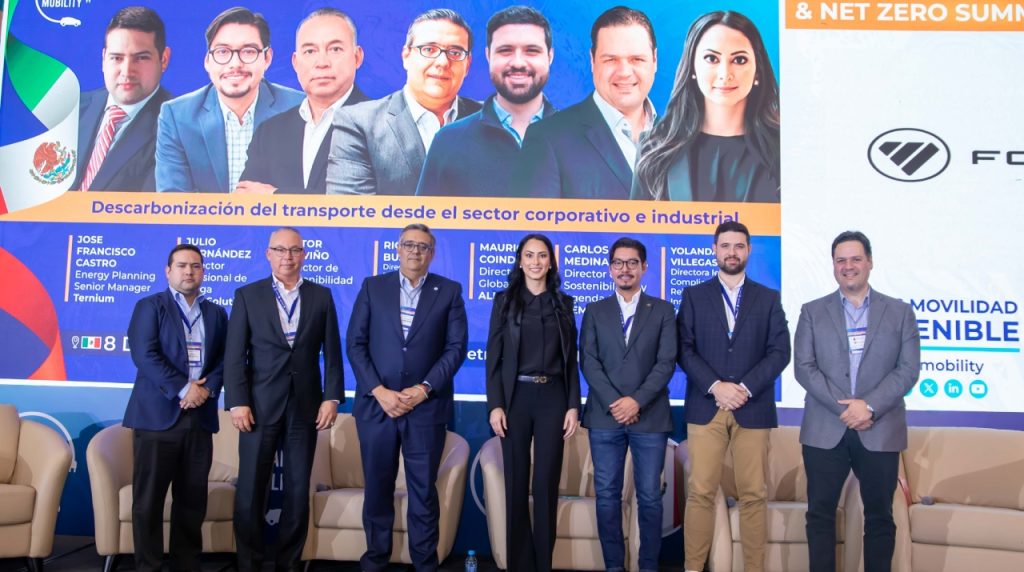The panel “Decarbonization of transportation from the corporate and industrial sector,” held as part of the North America Mobility & Net Zero Summit 2024, brought together business leaders committed to finding sustainable solutions to address the climate challenge.
With the participation of Ricardo Bussey, Director of Government Relations, Sustainability and Public Affairs in Latin America for Johnson Controls, Victor Treviño, Sustainability Director at FEMSA, Julio Hernandez, Divisional Director of Cargo at LDR Solutions, Carlos Medina Ayala, Sustainability and CO2 Agenda Director at CEMEX Mexico, Mauricio Coindreau, Global ESG Director at ALPEX, and Jose Francisco Castro, Energy Planning Senior Manager at Ternium, the panel explored innovative strategies to reduce carbon emissions in transportation, a crucial sector in the fight against climate change.
The panel was moderated by Yolanda Villegas, Legal Director of Compliance and Institutional Relations at Envases, who led the conversation on how the corporate and industrial sector is important in the transition to cleaner and more sustainable transportation.
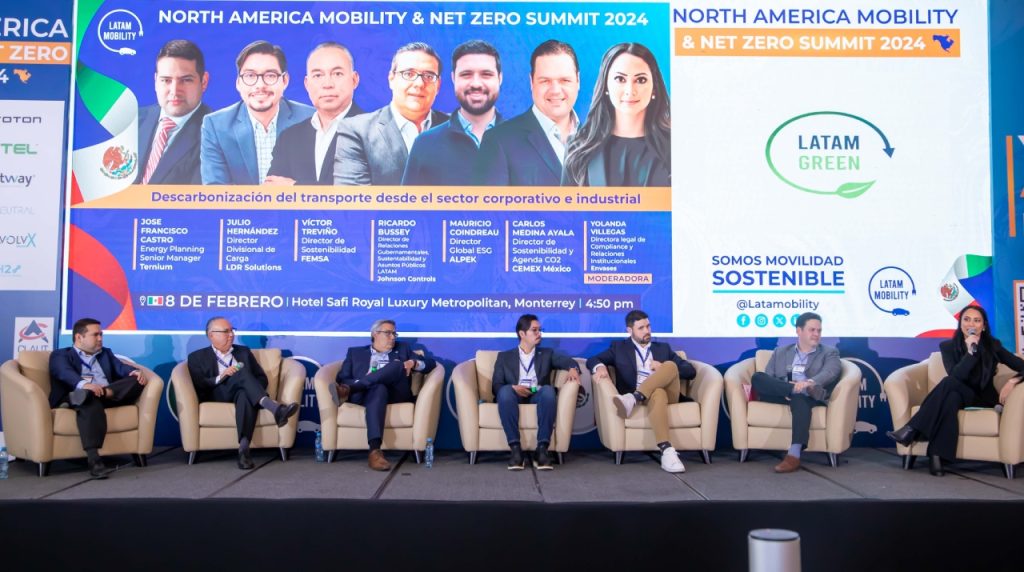
Decarbonization Challenges and Opportunities
Decarbonization has become a global necessity. In this context, companies from various sectors are taking on the challenge of reducing their carbon emissions and contributing to the transition to a more sustainable energy model.
Ricardo Bussey, Government Relations, Sustainability and Public Affairs Director for Latin America at Johnson Controls, highlighted the importance that the company attaches to decarbonization on all its operational fronts.
While it may surprise many that a company like Johnson Controls, recognized for its expertise in energy management systems and technologies for buildings, has a large fleet of service, it is precisely this type of companies that are called to lead the shift towards sustainability in the transport sector and mobility.
One of their main challenges, as well as other similar companies, lies in the diversity of contexts and levels of development in the countries where they operate. In the specific case of Mexico and the Latin American region, Bussey points out that, although the company aspires to a transition to 100% electric vehicles, the infrastructure is not yet mature enough to support this transformation immediately.
That is why Johnson Controls has opted for a gradual approach, starting with the integration of hybrid units in its fleet, allowing it to reduce emissions and take a first step towards decarbonization.
On the other hand, it is important to work hand in hand with governments and local authorities to establish clear regulations and promote legal certainty for investments in infrastructure and sustainable technology. In addition, Bussye emphasized the need to promote energy efficiency and diversify the energy mix, which are fundamental aspects for moving towards a low-carbon economy.
Finally, he raised the importance of changing the business mindset by incorporating disruptive technologies such as artificial intelligence to optimize processes and improve the response to market demand.
Sustainable Mobility: Integral Commitment
In the quest to reduce its environmental footprint, FEMSA has placed sustainable mobility at the center of its climate action strategy and sustainability approach, a commitment reflected through the words of Victor Treviño, FEMSA’s Director of Sustainability, who highlights the importance of adopting clean and efficient technologies to promote positive change in both the environment and the communities where they operate.
FEMSA’s approach to sustainable mobility ranges from technology assessment to the implementation of innovative solutions. Treviño highlights the analysis and evaluation process that the company has carried out, exploring alternatives such as route efficiency, the use of natural gas technology vehicles, and finally, the adoption of electric mobility.
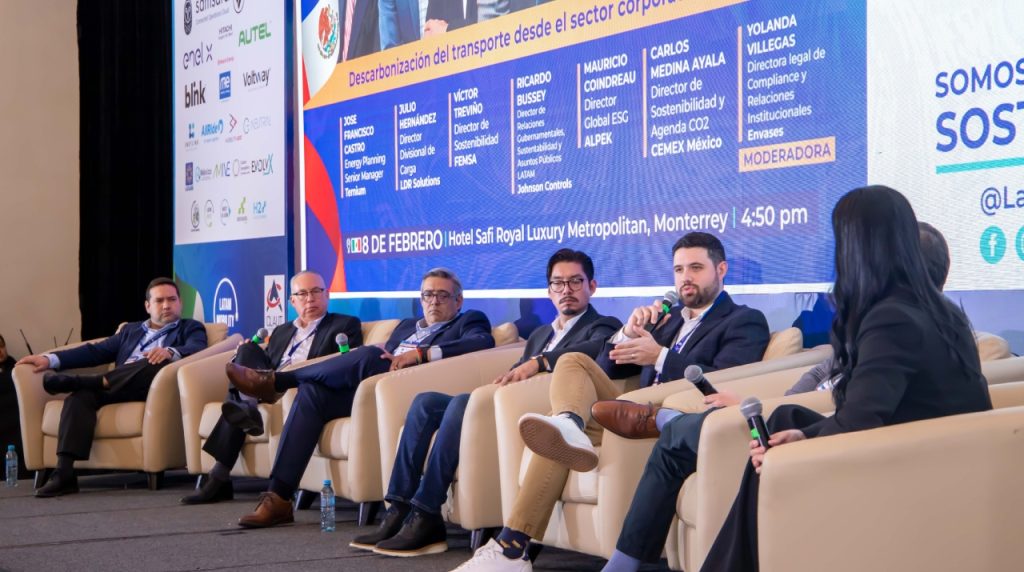
The choice of electric mobility is based on its environmental advantages and its ability to improve air quality in cities and its positive impact on communities. FEMSA recognizes the importance of reducing CO2 emissions, but also stresses the relevance of addressing air quality, a vital aspect of people’s health and well-being.
FEMSA’s commitment to electric mobility extends to all of its operations through the distribution of products via a fleet of more than 460 electric vehicles. However, the implementation of this technology is not without its challenges, such as regulatory variability in different regions and the need for adequate charging infrastructure.
In FEMSA’s sustainable mobility strategy, adopting a systemic approach that considers all dimensions of the business is key, involving integrating electric mobility with the company’s renewable energy sources.
In addition to operational challenges, Treviño recognizes the importance of influencing its entire value chain to promote sustainable practices, working with suppliers to encourage the adoption of clean and efficient technologies, educating and motivating customers and consumers about the benefits of electric mobility.
Technology Responsibility in Modern Logistics
The logistics industry is at an inflection point. In light of this, Julio Hernandez, Divisional Director of Freight at LDR Solutions, highlighted the importance of taking responsibility for the adoption of cutting-edge technologies to drive a comprehensive transformation in the sector.
Hernandez highlighted the role of mobility infrastructure operators (MIOs) in the implementation of cutting-edge technologies. He pointed out that it is these players who have the responsibility to provide access to state-of-the-art technology to companies in the sector.
In particular, he emphasized the need to address the transition to a circular economy, especially with regard to the responsible management of lithium batteries to reduce the carbon footprint.
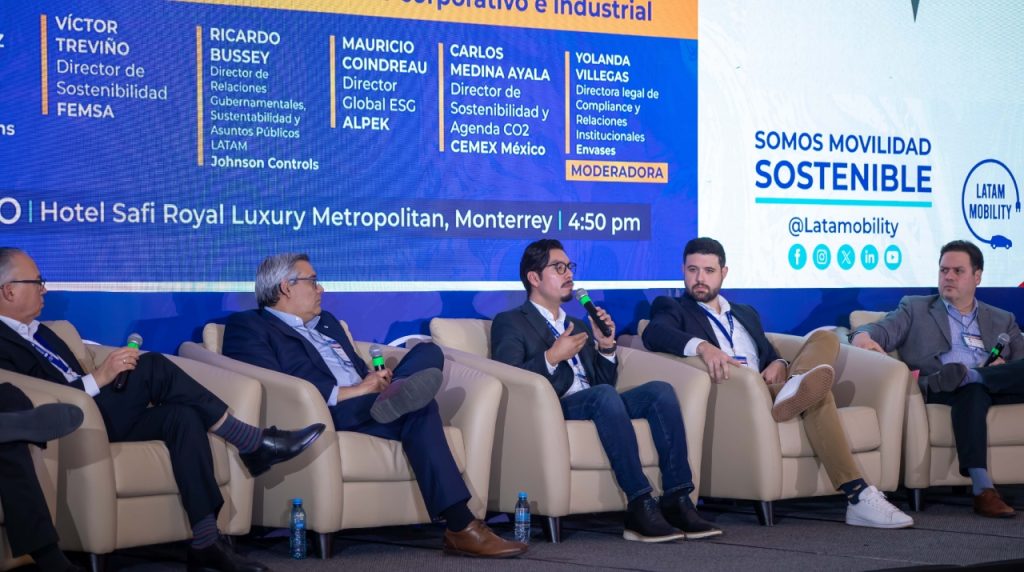
He also stressed the importance of rethinking the use of conventional fuels, such as diesel, in heavy-duty transport. He identified opportunities to adopt more efficient and sustainable technologies, such as lower displacement engines, which would reduce operating costs and mitigate CO2 emissions along with other harmful pollutants.
In this regard, LDR Solutions is firmly positioned at the forefront of the road to electric mobility by promoting hybrid and alternative technologies. In fact, Hernandez announced plans to introduce hybrid tractors with significant towing capacity, as well as hydrogen-powered tractor-trailer units in collaboration with international partners such as Israel.
However, the challenge goes beyond the adoption of innovative technologies. Hernandez emphasized the need to question existing paradigms in logistics, especially regarding obsolete operational practices.
He referred to the long wait of shippers for cargo as an example of how certain practices are taken for granted and need to be reevaluated and optimized. In addressing these challenges, he stressed the importance of a holistic and collaborative approach, urging companies to work together, challenging traditional models and recognizing that electric mobility is a joint effort involving all departments and stakeholders.
Challenging the Carbon Footprint
Concerns about climate change and environmental sustainability are at the forefront, and CEMEX Mexico, and its Sustainability and CO2 Agenda Director, Carlos Medina Ayala, are looking for ways to reduce their carbon footprint.
It is important to note that in sectors such as cement production, a large part of the carbon footprint is intrinsically related to the production of cement itself. According to Medina, between 85% and 87% comes directly from this stage of the production chain, mainly from the use of fuels and the process of decarbonizing materials to produce clinker, an essential component in the production of cement.
CEMEX Mexico is not sitting idly by in the face of this challenge, however, and has set goals to reduce its transportation-related carbon emissions. Medina highlights three key indicators: to reduce emissions from the transportation of inputs by 25% by 2030, to reduce emissions related to the transportation of fuels by 40%, and to reduce emissions associated with the transportation of products to customers by 30%, all based on a baseline established in 2020.
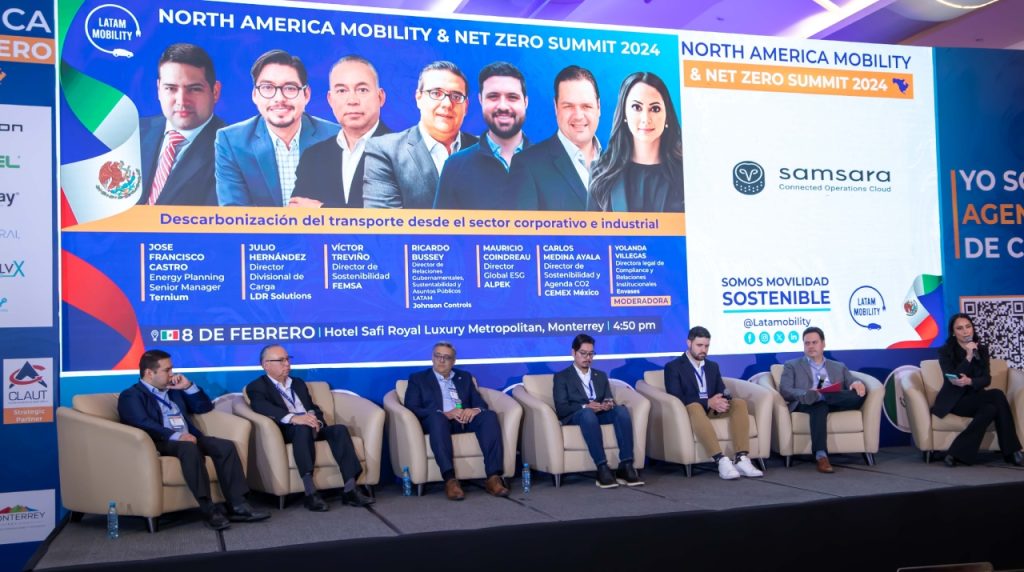
In terms of product transportation to customers, CEMEX Mexico has implemented specific strategies. On the one hand, the company is renewing its vehicle fleet every 5 to 7 years to ensure energy efficiency and emissions reduction.
In addition, they are exploring more sustainable alternatives, such as natural gas and hybrid vehicles, with the goal of making up 80% of their fleet by 2030. However, Medina acknowledges that achieving these goals will be no easy task.
One of the main challenges lies in the speed of deployment of these initiatives. Although the technological path is clear, it is essential to implement them in an agile and effective manner, giving priority to renewing the company’s own fleet and supporting outsourced carriers so that they can modernize their operations and have access to cleaner technologies.
Reflections from ALPEX
Increasingly aware of the need to adopt sustainable practices, Mauricio Coindreau, global ESG director of ALPEX, shared his reflections on this topic, highlighting the challenges and opportunities they face on their path to sustainability.
ALPEX, a petrochemical company with almost 50 years of experience, is committed to decarbonizing its operations and contributing to building a more sustainable future. Coindreau stresses the importance of this mission, noting that, at the end of the day, everyone shares the same goal: to make companies and cities more sustainable.
The road to decarbonization is not an easy one, as Coindreau points out. With a landscape full of options and emerging technologies, business faces the challenge of deciding where to invest its limited resources.
With so many possibilities, from biofuels to electrification, the task can be overwhelming. However, ALPEX has chosen to focus on efficiency as a first step toward decarbonization.
One area of focus for ALPEX has been optimizing its transportation logistics. Coindreau highlights how moving products via ships and trains, rather than trucks, has led to significant reductions in carbon emissions.
However, the road to decarbonization is not without its challenges. Coindreau mentions the need to align with the entire value chain to ensure the success of sustainable initiatives. He also highlights the complexity of coordinating actions at national and international levels, noting the importance of a collaborative approach to effectively address these challenges.
Despite the obstacles, Coindreau sees a promising future for decarbonization, elevating Mexico’s potential to become a leader in renewable energy production and highlighting the importance of working together, both nationally and organizationally, to take advantage of these opportunities.
Environmental Sustainability and Technological Innovation
Environmental awareness has become a priority, with companies adapting to this new scenario. In this regard, José Francisco Castro, Energy Planning Senior Manager at Ternium, one of the main flat steel producers in the Americas, explained how they are tackling this challenge with determination and vision for the future.
From his position, Castro recognizes the importance of effective communication about the company’s sustainable practices. Although Ternium has historically maintained a relatively low carbon footprint compared to its competitors, they realized that they were not adequately conveying this message.
In response to this revelation and the global changes evident since 2020, (COVID) the company set out on a roadmap towards decarbonization by 2030 with the goal of reducing its emissions by 20% compared to the established baseline.
In light of this, Ternium opted not to subscribe to the trend of committing to carbon neutrality (Net Zero) without a solid plan to back it up. Castro argues that many companies making such pledges lack a clear understanding of how to fulfill them.
Instead, they decided to take concrete action, allocating $460 million to emissions reduction projects, focusing on four pillars, including a push for renewable energy.
They also seek to lay the groundwork for future technological innovations. Castro emphasizes his belief that technology will eventually provide effective solutions to achieve more ambitious sustainability goals.
Another aspect is sustainable mobility. Recognizing the importance of addressing all areas of operation, the company is investing in the transition to electric vehicles for personal and utility use.
This initiative has direct environmental benefits while generating a cultural change within the company, with employees actively adopting more sustainable transportation options. However, these efforts are not without challenges.
Castro points to the lack of electric charging infrastructure as one of the key obstacles they face. He also highlights the need for rapid and efficient technological implementation, as well as access to robust electrical grids to support the electrification of mobility in Mexico.
Despite these challenges, he is optimistic about the future of sustainability at Ternium and in Mexico in general, emphasizing the country’s potential to lead the way towards a greener future, as long as companies and institutions work together towards a common goal.

